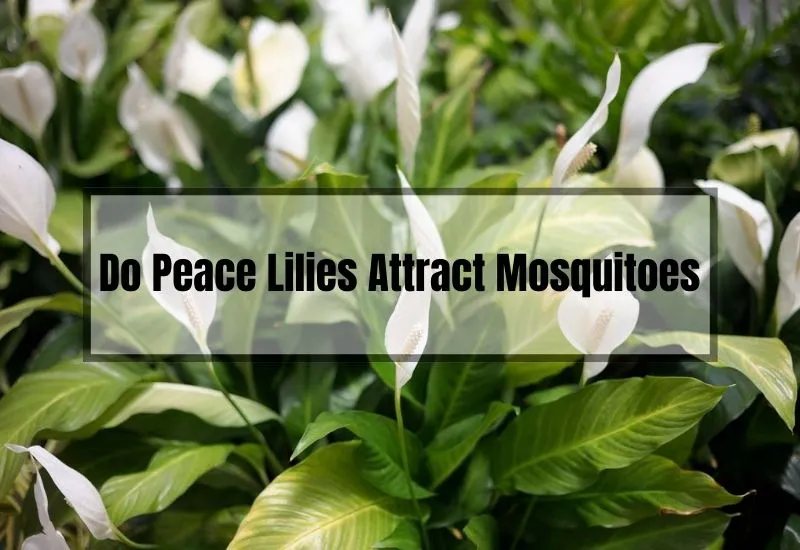Unveiling the Truth: Do Peace Lilies Attract Mosquitoes?
You love your peace lily. It’s the perfect addition to your home decor, and it’s easy to care for. But you’ve heard a rumor that peace lilies attract mosquitoes. Is it true? Do you need to get rid of your beloved plant to avoid being bitten by pesky bugs?
The answer is no, peace lilies do not specifically attract mosquitoes. While it’s true that some plants can attract mosquitoes, peace lilies are not one of them.
In fact, peace lilies can actually help purify the air in your home by removing harmful toxins. So, you can breathe easy and enjoy the beauty of your peace lily without worrying about attracting mosquitoes.
Key Takeaways:
- Peace lilies do not attract mosquitoes.
- Peace lilies can help purify the air in your home by removing harmful toxins.
- To prevent mosquitoes, consider using natural repellents or removing standing water where mosquitoes can breed.

Do Peace Lilies Attract Mosquitoes?
If you’re a fan of houseplants, you might have heard the rumor that peace lilies attract mosquitoes. But is there any truth to this claim? Let’s dig in and find out.
The short answer is no, peace lilies do not specifically attract mosquitoes. In fact, there is no scientific evidence that suggests peace lilies attract mosquitoes. Mosquitoes are attracted to standing water, sweat, and carbon dioxide. They are not attracted to peace lilies or any other houseplants in particular.
However, there are some plants that do attract mosquitoes. For example, water lilies tend to grow in regions where mosquitoes thrive. They have a very sweet aroma, which is another mosquito magnet. So, if you want to enjoy your backyard without any pesky insects, it’s best to avoid planting water lilies in your garden.
On the other hand, there are some plants that can actually repel mosquitoes. Basil, for example, contains an oil called estragole that’s toxic to mosquito larvae. So, the best place to plant basil is near a water source. It will control the mosquito population in the area and prevent mosquitoes from laying eggs.
Peace Lilies and Mosquitoes: The Connection

Peace lilies are beautiful houseplants that are known for their ability to purify the air. However, there is a common myth that peace lilies attract mosquitoes. The truth is, peace lilies do not specifically attract mosquitoes. Mosquitoes are attracted to standing water, which is where they lay their eggs.
That being said, peace lilies can indirectly attract mosquitoes if they are overwatered and the water is allowed to pool around the base of the plant. This creates a breeding ground for mosquitoes, which can then lead to an increase in their population in the surrounding area.
To avoid this, make sure to water your peace lilies properly. Water them only when the top inch of soil is dry and make sure to empty any excess water from the saucer underneath the pot. This will prevent any standing water from accumulating and discourage mosquitoes from laying their eggs in the area.
Additionally, if you notice any mosquitoes in the area, you can use natural mosquito repellents such as citronella candles or essential oils like peppermint or lemon eucalyptus to keep them at bay.
How Peace Lilies Can Help Reduce Mosquitoes
Purifying Air and Removing Pollutants
Far from being mosquito magnets, peace lilies are actually champions at improving indoor air quality. They’re known for their ability to remove pollutants like benzene, formaldehyde, and trichloroethylene from the air. Cleaner air means a healthier environment for both you and your plants!
Benefits of Having Indoor Plants
Having plants indoors doesn’t just add a touch of beauty to your space; they can also help reduce stress, boost your mood, and even improve productivity.
Plus, some plants, like the peace lily, can help keep your home’s air fresh and clean. So, go ahead and embrace your inner plant parent!
Preventive Measures Against Mosquitoes
Mosquitoes can be a real pain, especially when they ruin your outdoor activities. Although peace lilies do not attract mosquitoes, it is still important to take preventive measures to avoid mosquito bites. Here are some tips to help you keep mosquitoes at bay:
1. Eliminate Standing Water
Mosquitoes breed in stagnant water. Eliminating standing water around your home can help reduce the mosquito population. Empty any containers that hold water such as buckets, old tires, and flower pots.
Clean your gutters regularly to prevent water from collecting in them. Ensure that your swimming pool is properly treated with chlorine to prevent mosquito breeding.
2. Use Mosquito Repellent
Using mosquito repellent is a great way to protect yourself from mosquito bites. Repellents containing DEET, picaridin, or oil of lemon eucalyptus are effective at keeping mosquitoes away.
Apply the repellent on your exposed skin and clothing before going outside, and reapply as necessary.
3. Wear Protective Clothing
Wearing protective clothing can help reduce the amount of exposed skin that mosquitoes can bite.
Wear long-sleeved shirts and pants, and tuck your pants into your socks to prevent mosquitoes from getting inside. Light-colored clothing is also less attractive to mosquitoes.
4. Install Mosquito Nets
Installing mosquito nets around your bed or outdoor seating area can help keep mosquitoes away. Mosquito nets are available in different sizes and shapes, and can be easily hung from the ceiling or attached to poles.
5. Use Plants That Repel Mosquitoes
Certain plants such as basil, lavender, and citronella can repel mosquitoes. Planting these around your home can help reduce the mosquito population. Additionally, avoiding planting water lilies in your garden can help prevent mosquitoes from breeding in the stagnant water.
By following these preventive measures, you can reduce the mosquito population around your home and avoid mosquito bites. Enjoy your outdoor activities without any pesky insects!
Other Plants That May Attract or Repel Mosquitoes
Plants that Can Attract Mosquitoes
Plants with water-holding abilities: Bromeliads and some types of ferns can hold water in their leaves, which can create a cozy mosquito nursery. Be mindful of this when choosing plants for your indoor garden.
Plants that emit strong fragrances: While not a direct cause for mosquito attraction, fragrant plants can sometimes confuse our senses and make it harder to detect the presence of mosquitoes.
Plants that Repel Mosquitoes
- Citronella: This plant is a popular natural mosquito repellent, thanks to the strong lemony scent it releases.
- Marigolds: These colorful flowers contain a compound called pyrethrum that’s found in many insect repellents, making them a great choice for warding off mosquitoes.
- Lavender: With its lovely scent and beautiful purple flowers, lavender is not only pleasing to the eye but also has natural mosquito-repelling properties.
Tips for Choosing the Right Plants to Keep Mosquitoes at Bay
- Research before you buy: Make sure you know the mosquito-attracting or repelling properties of a plant before adding it to your collection.
- Combine different repellent plants: Mix and match mosquito-repelling plants to create a diverse indoor garden that keeps pesky insects away.
- Keep your plants healthy: A well-cared-for plant is less likely to harbor pests and more likely to thrive.
Common Peace Lily Pests and How to Manage Them
While mosquitoes aren’t a significant concern for peace lilies, there are other pests to watch out for. Let’s take a closer look at these unwanted visitors and how to keep them in check.
Mealybugs
Mealybugs are tiny, white, and fuzzy-looking insects that love to feast on your peace lily’s sap. They can weaken your plant and cause yellowing leaves. To manage mealybug infestations, you can:
- Use a cotton swab dipped in rubbing alcohol to remove the bugs.
- Spray your plant with insecticidal soap or neem oil.
- Release beneficial insects like ladybugs to help control the mealybug population.
Scale Pests
Scale pests are small, round insects with a protective shell-like covering. They suck the sap from your peace lily, causing yellow spots and wilting leaves. To manage scale infestations, you can:
- Scrape the pests off your plant with a soft toothbrush or your fingernail.
- Apply insecticidal soap or horticultural oil.
- Introduce beneficial insects like lacewings or ladybugs.
Fungus Gnats
Fungus gnats are tiny black flies that lay their eggs in damp soil, and their larvae can damage your peace lily’s roots. To manage fungus gnat infestations, you can:
- Let the soil dry out between waterings to discourage gnat reproduction.
- Use yellow sticky traps to catch adult gnats.
- Apply a soil-drenching insecticide or use a biological control like beneficial nematodes.
Spider Mites
Spider mites are minuscule arachnids that can cause yellow speckles on your peace lily’s leaves. To manage spider mite infestations, you can:
- Wipe down the leaves with a damp cloth to remove the mites.
- Spray your plant with insecticidal soap or horticultural oil.
- Increase humidity around your plant, as spider mites thrive in dry conditions.
Frequently Asked Questions (FAQs)
How can I prevent mosquitoes from breeding in my peace lilies’ potting soil?
Avoid overwatering and let the soil dry out between waterings to prevent creating a mosquito breeding ground.
Are there any other pests that are attracted to peace lilies?
Mealybugs, scale pests, fungus gnats, and spider mites are common pests that can infest peace lilies.
Can I grow peace lilies outdoors without attracting mosquitoes?
Yes, you can grow peace lilies outdoors without attracting mosquitoes. Just be mindful of your watering habits and eliminate any standing water nearby to reduce the chances of mosquito breeding.
What other plants can I grow indoors to help reduce mosquitoes?
Citronella, marigolds, and lavender are all excellent choices for indoor plants that help repel mosquitoes.
Can I use chemical insecticides on my peace lilies to deter mosquitoes?
While chemical insecticides can help control pests, they’re not specifically designed to deter mosquitoes. It’s best to focus on proper plant care and other mosquito-repelling plants to keep these insects at bay
Conclusion
In conclusion, peace lilies don’t specifically attract mosquitoes, and with proper care, they can even help create a healthier indoor environment. Remember to maintain a balanced watering schedule, choose the right plants for your space, and manage any potential pest infestations to keep your peace lilies and other indoor plants thriving.
Embrace your green thumb and enjoy the beauty and benefits that come with growing peace lilies and other mosquito-repelling plants!





